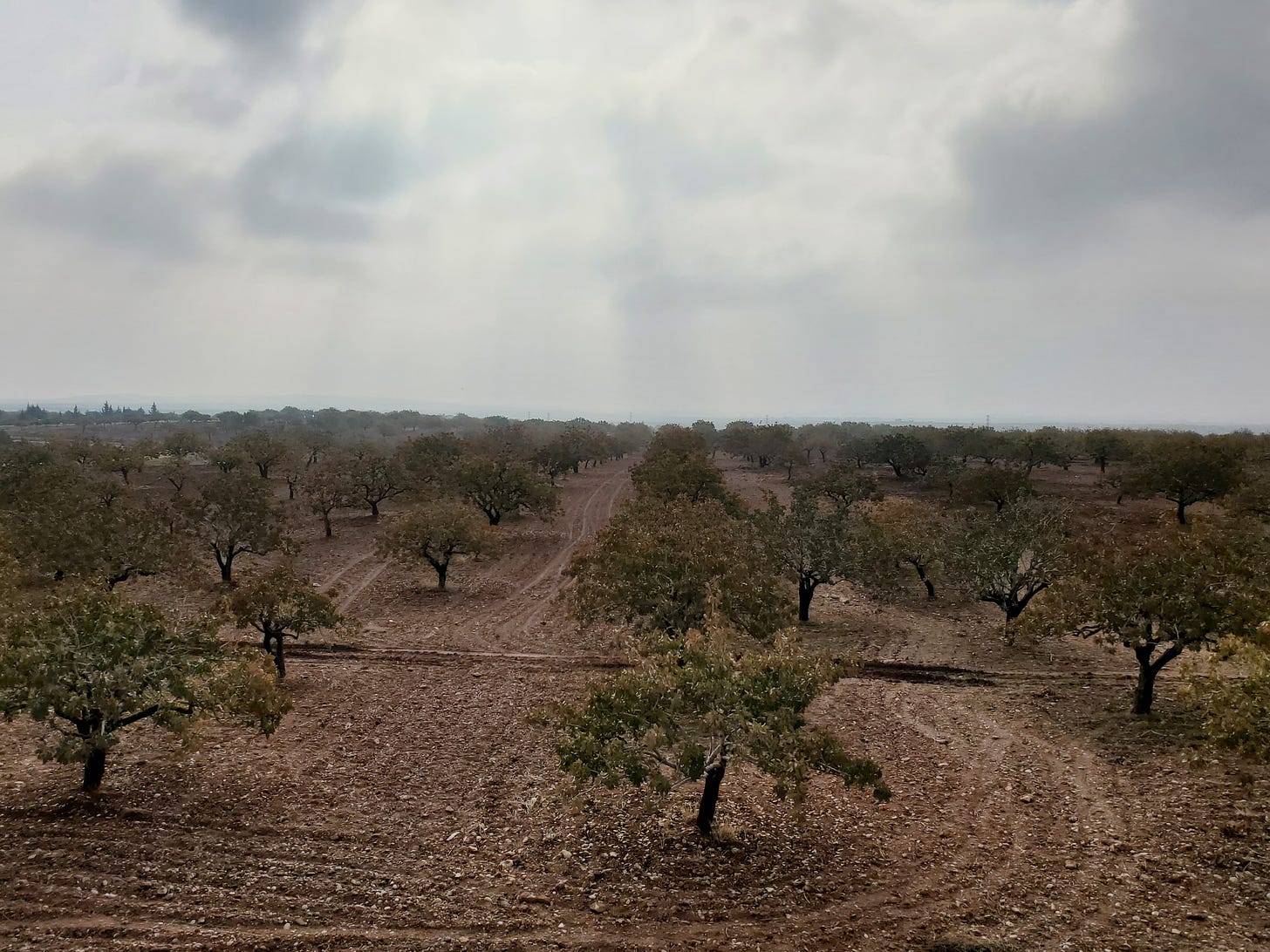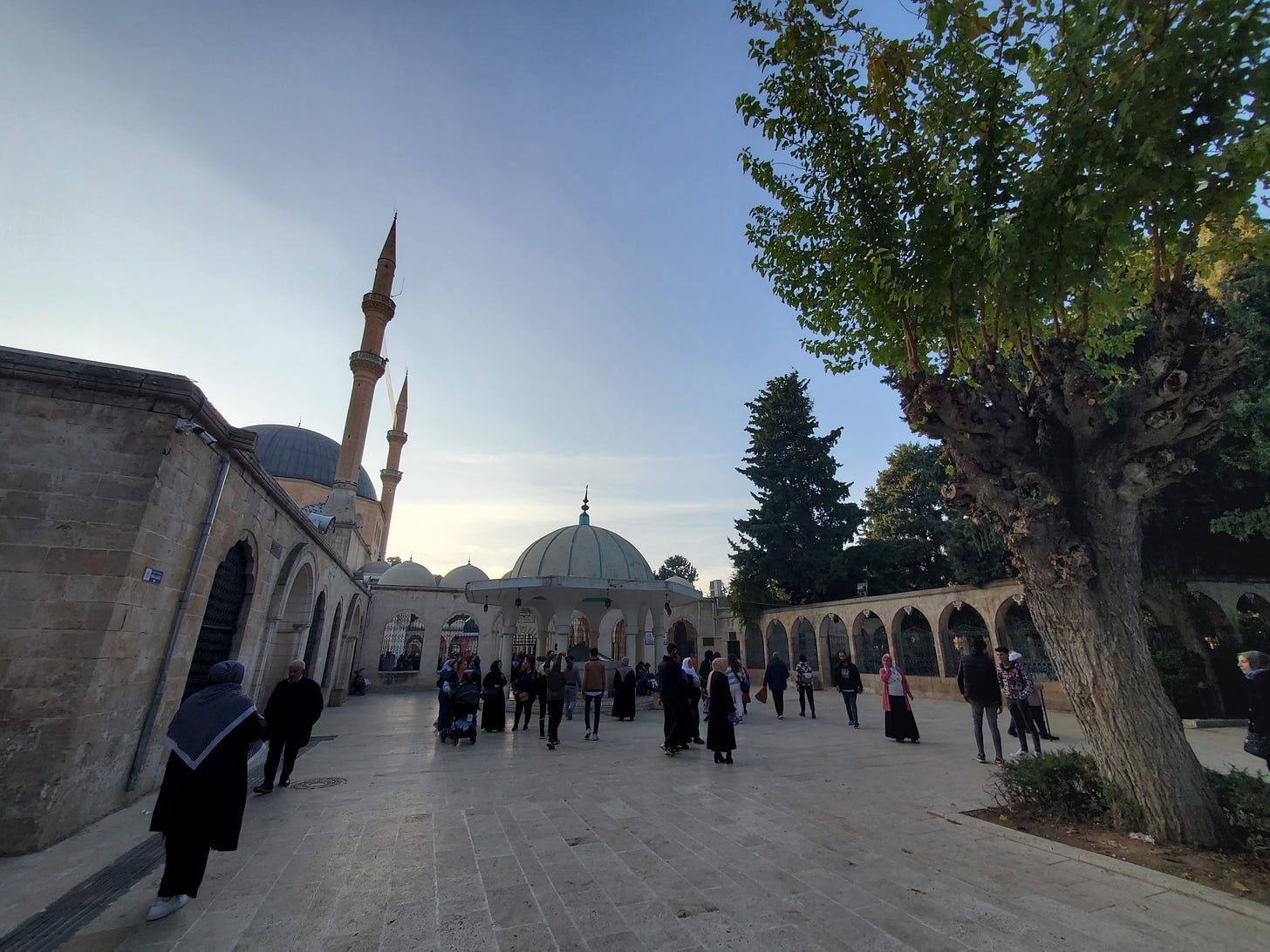An earthquake
With such an enormous earthquake moving between so many large cities, plus aftershocks, it seems difficult to put a precise location on the epicentre of the 7.8 magnitude earthquake that just hit Türkiye and the Syrian borders. I see Kahramanmaraş mentioned often, Antep, Malatya. When I woke up to the first news of the disaster, the first name I saw was Nurdağı, just west of Gaziantep. Nurdağı is a small city I cycled through the other month, about 5km from where this photo was taken. I went round a mountain highway bend and into a fast descent, down towards those plains you see beginning here. I stopped in Nurdağı for soup. The name of the city means roughly, though it sounds cleaner in Turkish, “divine light mountain”. It is the easternmost mountain and city along the strip of mountains that has Osmaniye to its west. In the fashion of cycling and pondering that make up much of touring by bike, I decided the name probably relates to it being the first place, half way up the mountainside, to see the dawn sun rising over the plains south and eastwards.
It is probably fitting to have a response so set in land and place. An earthquake is all about land and place, is about nothing but land and place. The photo shows the plains that go on to become the Syrian Plateau. Further on, beyond the ploughed fields, surrounding the rubble of Syrian villages in the Idlib region, are pistachio trees that grow as well there as they do in the Turkish region of Gaziantep. Because the earth does not care for the lines we draw ourselves above it. And so it will benevolently, but really, indifferently, nurture pistachios in both places; and so it will malevolently, but really, indifferently, snap fault lines together in both places. There is no such thing as ‘both places’, it is all one place. Thousands of people are dead, their lives and loved ones gone, and so it is impossible to know truly what else to say.
The distance from it now brings a sense of impotence that is hard, though of course why would or should I be there now? Another person in need of bedding, food? In return for what? Adding a little extra, lived detail to a written account read outside of the country? I trust the people of Türkiye to care for one another as well anyone can right now. In Istanbul malls people arrive to give blood. In diasporas they organise to send money. In the southeast region people take-in children waiting for their families to be found. In Türkiye it goes without saying that kitchens have been set up, people will be fed. I think the tenderness and urgency to look after people, much as it gives me strength, is also that which makes the situation more distressing, because – while I don’t really much believe in the idea of bad people - it leaves me cursing all the more at how unfair it is that this should happen to such good people.
That in itself though relates not just, or even at all, to anyone’s innate goodness or its absence, but more to how much many in the impacted region already suffered. The Turkish southeast is among the country’s poorest regions. Adana, Antep, Urfa, Osmaniye; the earthquake was my route. When there the other month, the struggle in the face of the Turkish version of our shared cost-of-living crisis was palpable. Work and money were already hard to come by. People had watched their not-easy lives made harder by sharing their towns and cities with the millions of refugees of Syria who had crossed the border to escape their civil war. And yet still they shared, because they knew that those people had escaped worse. And they had. And now, an earthquake crosses that same border as if it were not even there. Because, truly, it is not even there, but only in these rare moments of disaster on planetary proportions does the earth insist on as much. This is so hard because so many had already lost so much, were digging such reserves to hold on.
In this respect, an earthquake too is like an indicator substance dropped into a political solution to show its properties. It shows how borders and the systems that prevail inside different ones dictate human affairs in ways that can then shape outcomes, rather than have outcomes shape them. In west Türkiye, there is much to suggest, under the international gaze of media from past earthquakes, and neoliberal real estate values, that earthquake-proofing has taken place and been effective. In east Türkiye, a similar level of scrutiny has maybe not been evident, and whatever happens now, whatever the level of unstoppable that this earthquake surely commanded, questions will have to be asked and answered. Why did the state hospital in Iskenderun collapse? I ask myself. And then I recall that Gaziantep Castle also collapsed, having withstood two millennia and the great earthquake in Erzincan, 1939. For all that AKP cronies may exist in the construction sector, they did not build Gaziantep Castle. This was big, and you cannot stop everything.
But none of this, like everything and perhaps especially in Türkiye, happens in a vacuum. The earthquake across the border in northwest Syria, a region full with refugees living under Turkish military protection, will hit harder. The US sanctions on Syria, even as the US pleads its desire to help the country, to save Syrians from their leadership, will make everything harder. Though those in tent camps may for once fair better than those in the now-ruined urban environments, Syria has less heavy machinery or rescue teams to move or search rubble. Survivors have less to provide for themselves afterwards, having already lost more of the less they had left to start with.
There will be talk of building regulations in Türkiye, of political connections with the construction sector. There should be, but again, this does not happen in a vacuum. The houses of south eastern Türkiye that have now melted away as concrete dust, especially in Antakya and Hatay, were often thrown up in places where refugees have been homed in enormous number. Low-quality, quickly built housing is part of what helped people comparatively quickly begin to build new lives. Perhaps it should not have been this way, perhaps this is only the way of the world. When you leave a warzone, the ‘low quality’ part of low-quality housing is probably less important. When you have nothing else to go to, low-quality housing becomes less of a problem. Political corruption and the construction sector becomes a problem of a lower order. Like earthquakes, standards to some extent do cross borders, because so too do different sets of expectations.
The same problems that will obstruct a Syrian rescue operation and recovery now are only a continuation of the problem that had a million Syrians move into this region of Türkiye in the first place. I do not want this to become a political treatise, but the same issue that created the Syrian War – US interventionism and the US-Israeli project to fill the region with easily-controlled client or failed states – is what, particularly in sanctions, will make rescues in Syria so much harder. It helped create a region of Türkiye where it will, while a failed state fails the people nextdoor, be harder to bring standards that are established elsewhere in the country. Borders are more porous than people think, particularly when, as Türkiye, you have a humane refugee policy, you take-in those who have been unfairly obliged to settle for less.
I do not right now have optimism. Unfair is the word that comes most to mind. More people will die and be found dead. The weather and winter is against the rescue. It hurts because so many were already trying so hard to build life, and I have always rejected the idea that things should be upbeat in order to be constructive. Things must change. If disaster on this scale could have been avoided then next time it must be. The earthquake was enormous, destruction guaranteed, but the country, and its neighbours in weaker starting positions, must be built to standards where it can withstand whatever is possible to withstand. US sanctions have to be lifted, lifted everywhere. The United States needs to stop its experimentation in, and tolerance for creating, failed states. It is not tenable and disasters both manmade and natural leave too much suffering in them.
Türkiye meanwhile must be rebuild its cities, and in them - as is anyway best-practice - leave more open space, particularly parks, for parks do not fall and in earthquakes provide place for people to gather and seek safety. For now, my only silver lining is in seeing the quite obvious rush from all across Türkiye and further afield to help the country. In a region that has often by outsiders or extreme nationalists of all stripes had its difference accentuated, this spirit of total unity is a good thing, is special. This is how a country is built.
To donate direct to a Turkish NGO already active on the ground:
https://www.akut.org.tr/bagis-yap
To an international campaign led by the Turkish Philanthropy Society:
https://donate.tpfund.org/campaign/gaziantep-earthquake-fy23/c465112
To Syria:
https://msf.org.uk/article/syria-turkey-earthquake-what-msf-doing







